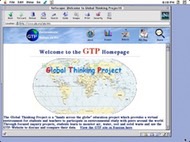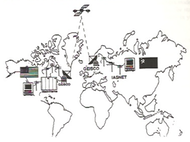AHP - Soviet Exchange Project 1983 - 2000
Thirty years ago, a Russian train left Helsinki for Moscow carrying psychologists and educators from North America who were participants in the first citizen diplomacy project sponsored by the Association for Humanistic Psychology (AHP). That train trip was the start of a 20-year Track-II[ Diplomacy Project, and evolved into a global teacher and student environmental activist project that brought together hundreds of teachers and students not only from the United States and the former Soviet Union, but colleagues and students in many other countries including Australia, the Czech Republic, and Spain.

Fran Macy, Director of the first AHP-Soviet Exchange Project delegation in September 1983 standing in front of the Russian train, The Tolstoy.
The fundamental goal of the AHP - Citizen Exchange Project was to bring together North American and Soviet professional psychologists, therapists, and educators to collaborate on mutual problems, to learn about others’ practice and theory, and, by knowing each other, to contribute to the reduction of tension that existed between the superpowers. Specifically the project sought to:
- Sponsor delegations to the Soviet Union on an annual basis to share values, theories and practices of humanistic psychology and education.[i]
- Develop agreements with Soviet institutions and individuals to carry out collaborative activities.[ii]
- Facilitate the publication of joint and individual articles, papers, and reports.[iii]
- Facilitate and support informal relationships between AHP delegates and their Soviet counterparts.
- Invite and sponsor Russian colleagues and delegations to the United States.[iv]
- Contact Soviet refuseniks and dissidents, especially during the early years of the project.[v]
The AHP exchange project had a powerful beginning, and continued for nearly two decades, but has had lasting affects, even to today[vi].
Global Thinking Project

The Global Thinking Project engaged students from different countries in the exploration of global environmental topics by means of a computer-mediated telecommunications network. The project grew out of more than 15 trips to the former Soviet Union sponsored by the Association for Humanistic Psychology beginning in 1983. Through seminars, classroom visits, laboratory demonstrations, and other informal and formal experiences, international agreements were signed between Georgia State University and the Russian Academy of Education. The goals of the project serve as a vehicle to empower students and teachers in diverse communities to explore new ways to think and learn about themselves and the planet Earth, as well as to identify, explore and take action on real problems and issues. Currently the project brings together nearly 70 teachers and 2500 students from six countries to learn to think globally.
Using teaching and learning materials developed by teachers, the participants in the project are joined together by virtue of the following goals:
- To empower students individually and as members of cooperative learning groups to contribute to the understanding and solution of local environmental problems that have global consequences.
- To enable students in different cultures to communicate with each other by means of computer-mediated telecommunications.
- To help students develop the knowledge, skills and affective qualities to take responsible citizenship action on environmental problems and issues.

